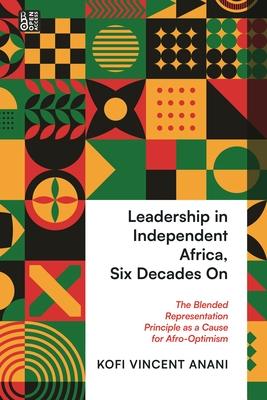In this open access book, Kofi Anani finds ways forward through the Blended Representation Principle (BRP), which stipulates that power be shared between leaders selected on the basis of Western-democratic ideals and leaders chosen on the basis of traditional African norms and conventions. Drawing on his research and professional experience, Anani shows how incorporating the BRP into African leadership and governance thinking would encourage more voluntary public participation in politics, guarantee transparency and accountability in decision-making, particularly when it comes to the use of public resources, and ultimately encourage more public confidence in leaders. Anani also provides concrete suggestions for how to achieve all this, not through quick fixes, but rather through educational campaigns directed at public officials and through new communities of learning and practice designed to champion the BRP in villages, schools, workplaces, places of worship, and other social organizations.
This book is a must-read for all scholars and students of postcolonial governance and leadership, and it is of keen interest to anyone concerned with how Western-style state-making might ultimately find a balance with other, indigenous modes of social organization. The ebook editions of this book are available open access under a CC BY-NC-ND 4.0 licence on bloomsburycollections.com. Open access was funded by the Bloomsbury Open Collections Library Collective.
Leadership in Independent Africa, Six Decades on: The Blended Representation Principle as a Cause for Afro-Optimism
In this open access book, Kofi Anani finds ways forward through the Blended Representation Principle (BRP), which stipulates that power be shared between leaders selected on the basis of Western-democratic ideals and leaders chosen on the basis of traditional African norms and conventions. Drawing on his research and professional experience, Anani shows how incorporating the BRP into African leadership and governance thinking would encourage more voluntary public participation in politics, guarantee transparency and accountability in decision-making, particularly when it comes to the use of public resources, and ultimately encourage more public confidence in leaders. Anani also provides concrete suggestions for how to achieve all this, not through quick fixes, but rather through educational campaigns directed at public officials and through new communities of learning and practice designed to champion the BRP in villages, schools, workplaces, places of worship, and other social organizations.
This book is a must-read for all scholars and students of postcolonial governance and leadership, and it is of keen interest to anyone concerned with how Western-style state-making might ultimately find a balance with other, indigenous modes of social organization. The ebook editions of this book are available open access under a CC BY-NC-ND 4.0 licence on bloomsburycollections.com. Open access was funded by the Bloomsbury Open Collections Library Collective.